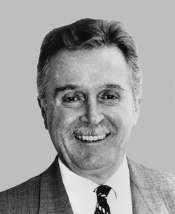Fred Heineman
| Fred Heineman | |
|---|---|
 | |
| Member of the U.S. House of Representatives from North Carolina's 4th district | |
|
In office January 3, 1995 – January 3, 1997 | |
| Preceded by | David Price |
| Succeeded by | David Price |
| Personal details | |
| Born |
December 28, 1929 New York City |
| Died |
March 20, 2010 (aged 80) Raleigh, North Carolina |
| Political party | Republican |
| Spouse(s) | Barbara / Linda Gilstrap |
| Children | 5 |
Frederick K. "Fred" Heineman (December 28, 1929 – March 20, 2010)[1] was a Republican U.S. Congressman from North Carolina, serving in the 104th United States Congress.
Born in New York City, New York, Heineman attended Mt. St. Michael High School in The Bronx. He then studied at Concordia Junior College, Westchester Community College, the University of Bridgeport, St. Francis College, and John Jay College. Heineman served in the United States Marine Corps from 1951 to 1954, and worked as a New York City police officer between 1955 and 1979.[2]
In 1979, Heineman came to Raleigh, North Carolina as that city's chief of police. He served for 15 years, a time when Raleigh began an explosive period of growth that continues today. He promoted many women and minorities to senior positions for the first time, and cut a distinct figure with his thick New York accent.[3] In 1994, he stepped down as chief of police and ran for Congress as a Republican against incumbent Democrat David Price, besting Price in the "Republican Revolution" of 1994. After a single term in the 104th Congress (January 3, 1995 – January 3, 1997), Heineman was defeated for re-election in 1996 by Price.
Despite representing a fairly Democratic district, Heineman had an unshakably conservative voting record, garnering perfect 100s from the American Conservative Union during his brief tenure but also represented the needs of his district which contained several universities and research-based corporations including ABB, GlaxoSmithKline, IBM, Quintiles, and Red Hat. Heineman brokered a House-Senate budget agreement to create a new consolidated research facility for the U.S. Environmental Protection Agency's research operations. The new facility would consolidate more than 1,400 workers in seven outdated buildings scattered throughout Research Triangle Park. [4]
Two bills introduced by Heineman were passed by the House of Representatives: H.R. 1499, The Consumer Fraud Prevention Act of 1995 passed on September 25, 1996; and H.R. 3852, The Comprehensive Methamphetamine Control Act of 1996 passed on September 26, 1996. He also co-sponsored 174 bills during the 104th Congress. Heineman cast 1,287 votes (95.8%) and did not vote 56 times (4.2%).
He came under fire when he claimed that despite making a combined $183,000 from his NYPD and Raleigh pensions and his congressional salary, he was part of the "lower middle class." He further argued that anyone making between $300,000 and $750,000 was a member of the middle class.[5]
Fred Heineman died of natural causes on March 20, 2010 at his home in Raleigh.[1] To the day he died, he was nicknamed "the Chief."[3]
References
- 1 2 Sloane Heffernan (March 21, 2010). "Former Raleigh police chief dies". WRAL-TV. Retrieved 2010-03-23.
- ↑
- United States Congress. "Fred Heineman (id: H000452)". Biographical Directory of the United States Congress. Retrieved on 2008-04-01
- 1 2 Quillin, Martha. Heineman, ex-police chief, dies. The News & Observer, 2010-03-22.
- ↑ O'Brien, Chris (April 26, 1996). [www.newsobserver.com "EPA To Get Unified Home In Triangle"] Check
|url=value (help). The News and Observer. - ↑ Roberts, Sam. Another Kind of Middle-Class Squeeze. New York Times, 1997-05-18.
External links
| U.S. House of Representatives | ||
|---|---|---|
| Preceded by David Price |
Member of the U.S. House of Representatives from North Carolina's 4th congressional district 1995–1997 |
Succeeded by David Price |